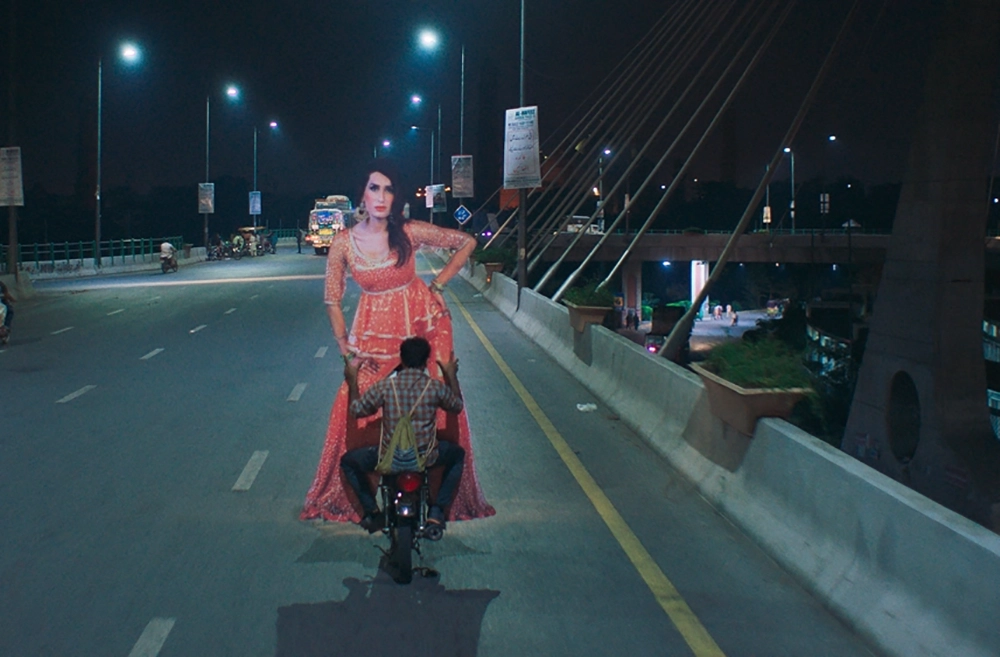“Joyland” has courted controversy but simultaneously earned accolades (ranging from winning at Cannes to eventually being shortlisted as Pakistan’s official entry to the Oscars). It revolves around Haider, an unemployed young man who finds employment as a back-up dancer with a burlesque troupe at the local theatre. Haider has grown up in a patriarchal household where ‘Western beliefs’ (such as women wishing to remain employed post-marriage, and men who display ‘effeminate’ traits) are frowned upon. His new career not only opens up an outlet for Haider to release his repressed inhibitions, but also leads to a passionate affair with his employer, a trans woman who goes by Biba (or Madame, to those who work under her).
Doing the Film’s Themes — and Participants — Justice
However Haider’s secretive sexual trysts with Biba — and his progressively changing outlook on his sexuality — have consequences. Haider’s pushback against the patriarchal mindsets that held him back also end up opening a can of worms for his, wife, Mumtaz, who risks losing her own freedoms. He’s also at risk of being outed by nosy neighbours and his judgmental older brother, who already takes pleasure in shaming his younger sibling for taking the role of an ’emasculated house husband’ even prior to him landing this risqué job opportunity. On the other hand, Biba faces her own personal challenges, such as moments of desperation leading her to dance at sleazy nightclubs. She frequently finding herself in dangerous situations at the hands of privileged, perverted rich men who use sexual abuse as a power play. This is in addition to verbal abuse from her cis-gendered female peers on the burlesque scene.
Director Sadiq deserves applause for his decision to present a trans woman as one of the leads in his film. He deserves further praise for subverting expectations with the depiction of an empathetic and wholesome repartee between its two female protagonists, Mumtaz and her sister-in-law, Nucchi. This is especially since both women are extreme opposites when it comes to their socio-cultural perspectives. The former rebels against her patriarchal shackles while the latter finds it easier to naively give in to the controlling men of the household.
Powerful Performances All-Around

“Joyland” also sheds light on generational trauma with Haider, the metaphorical black sheep of the family. He develops cold feet at the thought of butchering a literal black sheep in the first half of the movie, which displeases his father, who chides him. Yet another highlight of the movie is the insight into the world of ‘khwaja-sira’ which is an underground network of trans people who develop a mentor-mentee relationship via shared experiences (this community has also been the focus of Sadiq’s earlier work prior to his feature film debut, such as his award-winning short film “Darlings”). However, “Joyland’s” highest achievement is that it succeeds at exposing the double standards and narrow-mindedness of the extremist individuals and powers who — ultimately — failed to succeed in banning/censoring this movie.
When it comes to performances, the ensemble cast are naturals. However, it’s the film’s leading ladies — Rasti Farooq (Mumtaz), Alina Khan (Biba), and Sarwat Gilani (Nucchi) — shine, sinking their teeth into their layered characters. They effortlessly exude confidence with a praiseworthy screen presences and sincere dialogue deliveries, lending nuance even with mere silences.
A Film and the Hopeful Future it Creates
Considering this is only her second feature film outing after “Darlings,” Alina Khan particularly excels at drawing from her lived experiences as a member of the khwaja-sira community. She comes across as nothing short of a show-stopper in the role of the feisty/self-confident Biba who lives her truth in a cutthroat and unfair world. She stands her ground regardless of the obstacles in her path, once prepared to brandish her fists when she catches her troupe cracking crass jokes at her expense. Sania Saeed as a widow and Haider’s neighbour who harbours a crush on the family patriarch also leaves an impression in her brief but pivotal role.

A picture is worth a thousand words, and the visuals of this movie are striking. This is particularly true of the overhead shots and close-ups during its intense and climactic scenes. The cinematography not only highlights the talented cast’s diverse facial expressions, but also create a sense of heightened tension and an emotionally stirring atmosphere.
Wrapping up this review, here’s me steadfastly hoping that going forward into the New Year, works like “Joyland” — and more filmmakers like Sadiq — will further embolden audiences in leaving behind old, regressive mentalities they’ve held on to in the past and embrace a more open-minded attitude towards their fellow men/women.
“Joyland” has been completing its festival circuits (recently showing at Sundance) and is not currently available for viewing. It has recently been picked up in a U.S. distribution deal by Oscilloscope.



